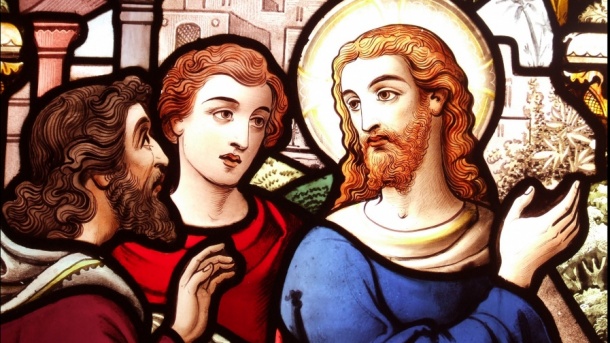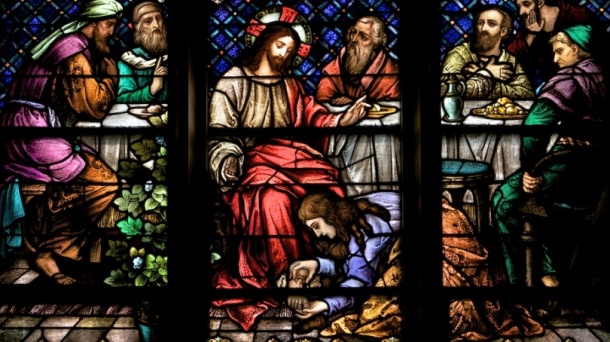The only question that matters
June 17, 2013 by Leave a Comment
The Twelfth Sunday in Ordinary Time, Year C – June 23, 2013
The second half of Luke’s Gospel is one great pilgrimage to Jerusalem, the city of destiny. For Luke, the Christian journey is a joyous way illuminated by the graciousness of the Savior of the world.
Along that way, Jesus asks a very important question of his disciples. “Who do you say that I am?” is the same question asked of every disciple in every age. From this moment onward in today’s Gospel, Jesus is on his way to the cross. Everything he says and does is another step toward Golgotha — where he will demonstrate perfect obedience, perfect love and total self-giving.
The incident in today’s Gospel (Luke 9:18-24) is based on Mark 8:27-33, but Luke has eliminated Peter’s refusal to accept Jesus as suffering Son of Man (Mark 8:32), and the rebuke of Peter by Jesus (Mark 8:33). Elsewhere in the Gospel, Luke softens the harsh portrait of Peter and the other apostles found in his Marcan source (Luke 22:39-46), which similarly lacks a rebuke of Peter that occurs in the source, Mark 14:37-38.
The disciples list a whole series of labels that people have applied to Jesus. And these names reveal all the different expectations held about him. Some thought of him as an Elijah, working toward a real confrontation with the powers that be. Some saw him as one of the ancient prophets.
When Jesus asks his disciples of their perception of him, he asks what people are saying about him. How do they see his work? Who is he in their minds? Probably taken aback by the question, the disciples dredge their memories for overheard remarks, snatches of shared conversation, opinions circulating in the fishing towns of the lake area. Jesus himself is aware of some of this. The replies of the disciples are varied, as are those of each of us today when Jesus, through someone else’s lips, asks us the same question, and with increasing frequency and intensity.
The concept of “Messiah” in Judaism
There was no single concept of “Messiah” in Judaism. The idea of Messiah “anointed one” as an ideal king descended from David is the earliest known to us, but in the Maccabaean period (about 163-63 B.C.) the Testaments of the Twelve Patriarchs, documents preserved to us in Greek, give evidence of belief in a Messiah from the tribe of Levi, to which the Maccabaean family belonged. The Dead Sea Scrolls contain various ideas: a priestly Messiah and the (lay) Messiah of Israel (1QSa); a prophet like Moses (Deuteronomy 18:18-19) who is also the star out of Jacob (Numbers 23:15-17) (4Q175); but also the Davidic Messiah (4Q174). Melchizedek is a deliverer also, but is not called Messiah (11QMelch).
To proclaim Jesus as the Messiah was a loaded and dangerous statement. It was all that Jesus’ enemies needed to use against him, and already there were many who were ready to enlist under the banner of a royal pretender. But, far more than this, such a role was not Jesus’ destiny. He would not and could not be that kind of militaristic or political Messiah.
Identifying Jesus Today
The struggle to identify Jesus and his role as Messiah continues today. Some say the individual Christian and the whole Church should be Elijah figures, confronting systems, institutions, national policies. That was the way Elijah saw his task. We only need to read the First Book of Kings (Chapters 17 to 21) to confirm this fact. Some say, like Jeremiah, that the domain of Christ, through his Church, is the personal and private side of life. Significantly, Jesus probes beyond both and asks, “You, who do you say I am?”
In Peter’s answer, “You are Messiah,” blurted out with his typical impetuosity, we are given a concept that involves both of the above ideas and goes beyond them. The Messiah came into society, and into individual lives, in a total way, reconciling the distinction between public and private. The quality of our response to this question is the best gauge of the quality of our discipleship. Let us remember certain facts and truths about Jesus’ background and world mission that have prepared for Christianity to be truly a world Church:
1) Jesus was born of political tribe of Judah – neither the priestly tribe of Levi nor the priestly family of Zaddok. Jesus was not a politician.
2) Jesus did have a sense of politics. World mission cannot be undertaken independently without serious interaction with politics.
3) Jesus established himself at Capernaum rather than in the desert or in some remote village. In his town along the northwest shore of the Sea of Galilee, there was a main road, tax collectors, and relations with the Roman centurion. Jesus was very much at home in Capernaum, not in Jerusalem.
4) Jesus bonded himself with all those who were sick and dying, with sinners, and those living on the fringes of society. Through his life, Jesus puts biblical justice into practice in proclaiming the Beatitudes. Authentic justice is a bonding of one’s self with the sick, the disabled, the poor and the hungry. But he did not neglect others as well. He dined with the rich and the mighty as well as with the poor and downtrodden. He teaches us an authentic spirit of inclusion of all people.
5) Jesus did not preach the political kingdom of David but the Kingdom of God. He had a great ability to appeal to everything and incorporate everything into his vision of kingdom. During his lifetime – he only tried to fulfill the hopes of Israel.
Piecing together the mosaic
If you have ever tried to piece together an ancient mosaic, you would know of the painstaking work involved in such an endeavor. During my biblical studies in the Holy Land, I participated in several archeological expeditions involving the discovery of ancient mosaics. Every little fragment matters in putting the whole picture together. In a similar way, when we attempt to answer Jesus’ question in today’s Gospel, “But who do you say that I am?” (Luke 9:20), we are being invited to piece together a magnificent mosaic
In today’s Gospel, Jesus will be the Messiah only when he lays down his life for others. And I will be like Jesus only when I lay down my life for others. Jesus’ identity is found in doing the will of God. Luke applies the same principle to us as disciples. Our true identity and purpose is found in going beyond ourselves. This is a daily task, “If any want to become my followers, let them deny themselves and take up their cross daily and follow me” (Luke 9:23). If I lose my life for Christ, I find it!
Remembering Tor Vergata 2000
One of the most powerful and memorable reflections on Jesus’ identity took place on the night of August 19, 2000 during the evening prayer vigil at Tor Vergata on Rome’s outskirts during World Youth Day of the Great Jubilee. I shall never forget that hot night, when silence came over the crowd of over one million young people as Pope John Paul II asked them the only question that matters: “Who do you say that I am?”
The elderly Pope addressed his young friends with those words that rang out over the seeming apocalyptic scene before him: “What is the meaning of this dialogue? Why does Jesus want to know what people think about him? Why does he want to know what his disciples think about him? Jesus wants his disciples to become aware of what is hidden in their own minds and hearts and to give voice to their conviction. At the same time, however, he knows that the judgment they will express will not be theirs alone, because it will reveal what God has poured into their hearts by the grace of faith.”
The Holy Father continued: “This is what faith is all about! It is the response of the rational and free human person to the word of the living God. The questions that Jesus asks, the answers given by the Apostles, and finally by Simon Peter, are a kind of examination on the maturity of the faith of those who are closest to Christ.”
It is Jesus
“It is Jesus in fact,” the Pontiff continued, “that you seek when you dream of happiness; he is waiting for you when nothing else you find satisfies you; he is the beauty to which you are so attracted; it is he who provokes you with that thirst for fullness that will not let you settle for compromise; it is he who urges you to shed the masks of a false life; it is he who reads in your hearts your most genuine choices, the choices that others try to stifle. It is Jesus who stirs in you the desire to do something great with your lives, the will to follow an ideal, the refusal to allow yourselves to be grounded down by mediocrity, the courage to commit yourselves humbly and patiently to improving yourselves and society, making the world more human and more fraternal.”
He concluded his memorable address with these words: “Dear friends, at the dawn of the Third Millennium I see in you the “morning watchmen” (cf. Is 21:11-12). In the course of the century now past young people like you were summoned to huge gatherings to learn the ways of hatred; they were sent to fight against one another. The various godless messianic systems that tried to take the place of Christian hope have shown themselves to be truly horrendous. Today you have come together to declare that in the new century you will not let yourselves be made into tools of violence and destruction; you will defend peace, paying the price in your person if need be. You will not resign yourselves to a world where other human beings die of hunger, remain illiterate and have no work. You will defend life at every moment of its development; you will strive with all your strength to make this earth ever more livable for all people.”
Who is this Jesus for us? This is indeed the only question that really matters.
__._,_.___


